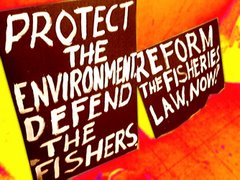
Fisherfolk Sail Cebu-Bohol Strait to Oppose Aussie Offshore Mining Firm
The offshore mining in Cebu-Bohol Strait and other parts of the Visayan basin will affect the livelihood of more than 100,000 small fishermen and 500,000 dependents, and will further exacerbate the problem of food security of 87 million Filipinos.
BY GERRY ALBERT CORPUZ
Bulatlat
Volume VIII, Number 30, August 31 - September 6, 2008
ARGAO, CEBU- Cebu-based fisherfolk activists belonging to Pamana-Sugbo, an affiliate of the leftwing fisherfolk alliance Pambansang Lakas ng Kilusang Mamamalakaya ng Pilipinas (Pamalakaya) staged a fluvial protest, Aug. 28, against offshore mining.
NorAsia Energy Limited, an Australian offshore mining company, plans to conduct oil and gas exploration at the Cebu-Bohol Strait.
Pamalakaya National Chair Fernando Hicap said that some 50 small fishing boats with 200 fishermen on board sailed from Sibonga town to Argao town in Cebu province to dramatize their opposition against what his group called the “Australian economic colonialization of Cebu-Bohol Strait.”
The Pamalakaya leader said that Bokkana-Bohol, its provincial chapter in Bohol province, is also planning to stage another fluvial protest in towns affected by the ambitious offshore mining project.
“This is just a dress rehearsal. The Australian mining firm should expect more daring sea-based protest actions in the near future against their anti-fisherfolk and anti-environment mining escapade in Cebu-Bohol Strait,” Hicap warned.
In Cebu City, Pamana-Sugbo spokesperson Wilbert Dimol confirmed Hicap’s statement that there would be more protests to pressure Malacañang, the Department of Energy (DoE) and the Department of Environment and Natural Resources (DENR) to scrap the government contract with NorAsia and stop the Office of the President from selling the Cebu-Bohol Strait and other parts of the Visayan Sea to international oil and gas explorers.
“We hope to double the number of fishing boats and the number of small fishermen in the next fluvial protest. The fisherfolk and the coastal village people want NorAsia out of Cebu-Bohol Strait,” Dimol added.
Letter to Australian PM
Last month, Pamalakaya emailed a three-page open letter to Prime Minister Kevin Rudd of the Australian Labor Party urging the Australian premier to order NorAsia to leave Cebu-Bohol Strait.
The group, in their letter to Rudd, asserted that the offshore mining in Cebu-Bohol Strait and the entire East Visayan basin would pave way for the systematic and gross destruction of the marine environment.
Pamalakaya told the Australian PM that the ‘far-reaching effects of oil and gas exploration even during its exploratory or prospecting stage prior to production and extraction are very certain based on the country’s previous experience with other offshore mining activities staged by foreign oil and gas groups.’
The letter was sent to the House of Representatives of the Parliament House of Australia based in Canberra.
The letter was sent last July 10 after the group learned that NorAsia Energy Limited was able to secure Area 8 Service Contract 69 that would allow the Australian oil and gas group to explore 7,400 square kilometers of marine waters encompassing the Cebu-Bohol Strait, a narrow sea strait separating the island provinces of Cebu and Bohol, and parts of Leyte in the East Visayan basin.
“It is over a month now, still there’s no response from Rudd and his labor party in Australia. This is a matter of life and death to the struggling fisherfolk of Cebu, Bohol and across the Visayas. The silence of Australian Prime Minister is puzzling us. Is he, as well as his colleagues in their labor party, a stockholder of Otto Energy, the mother firm of NorAsia?” Pamalakaya asked.
The group said the entire offshore mining activity will cover 445,000 hectares of marine waters over a seven-year period based on the agreement signed by NorAsia and its Filipino partner-the TransAsia Oil and Energy Development Corporation. The agreement was sanctioned by the DoE.
In 2007, NorAsia acquired 146 square kilometers of 3D seismic data over two prospects in Service Contract 51. It said Area 8 of Service Contract 69 offers significant follow-up potential in additional structures if initial drilling in Service Contract 512 is successful.
NorAsia said Service Contract 69 has approximately 3,000 kilometers of existing 2D seismic and an active petroleum system as shown by the abundant onshore oil seeps and seismic supported direct hydrocarbon indicators on prospects in the area.
214,000 air pollutants
In their letter to Rudd, Pamalakaya asserted that many studies revealed that offshore mining causes a significant amount of air pollution. Each offshore oil platform generates approximately 214,000 pounds of air pollutants each year. An average exploration well for natural gas could generate 50 tons of nitrogen oxides, 13 tons of carbon monoxide, six tons of sulfur dioxide and five tons of volatile organic hydrocarbons.
“Recent findings also revealed that oil and gas exploration activities could lead to massive production of other toxic waste materials such as cadmium which causes lung cancer; lead which causes gastrointestinal diseases, blood and kidney disorders,
mental retardation and affects the nervous system; chromium which causes lung and liver cancers, kidney and other respiratory illness,” the militant group added.
Pamalakaya said if Nor Asia will push its offshore mining, a severe fish crisis will happen. It could lead to a dramatic decrease of 600,000 metric tons in the yearly production of fish in the country or approximately 20 percent annually.
The offshore mining in Cebu-Bohol Strait and other parts of the Visayan basin will affect the livelihood of more than 100,000 small fishermen and 500,000 dependents, and will further exacerbate the problem of food security of 87 million Filipinos.
The offshore mining all over the Visayan Sea will have a devastating impact on fish production in Region VI composed of provinces Aklan, Antique, Capiz, Guimaras,
Iloilo and Negros Occidental which account for an average for 350,000 metric tons of fish harvest per year, while Region VII composed of Negros Oriental, Bohol, Cebu and Siquijor account for 205,000 metric tons of fish produced.
Region VIII is made up of Biliran, Eastern Samar, Leyte, Northern Samar, Western Samar and Southern Leyte yield and average of 100,000 metric tons of fish per year.
Moreover, oil and gas drilling operations produce huge amounts of water waste ranging from 1,500 to 2,000 metric tons of highly toxic water waste materials per drilling. The seismic tests, which are part of the exploration stage, damage the hearing organs of marine species, cause hemorrhage in body tissues, and damage their reproductive organs.
Pamalakaya said seismic blasting could cause behavioral modifications and reduce or eliminate available habitat for breeding, spawning, foraging and migration. Seismic noises can alter fish distribution by tens of kilometers and can elicit physiological
stress on neural-immune responses in marine organisms.
The group also said seismic tests damage plankton eggs and larvae found in the immediate vicinity of airgun, and reduce catches in commercial fishers. It also
damages swim bladders of fishes and lungs of marine mammals.
“We believe stopping NorAsia from destroying our marine resources in the name of corporate super profits is a tough act, but this is the politically, morally and legally correct way to address the concern of our fisherfolk and the Filipino public in general,” Pamalakaya said. Bulatlat
* Printer friendly version
* send to friend
feedback
( categories:
* 2nd story
)
RELATED ARTICLES
* Fishers Group Spearheads Campaign Against Off-Shore Mining
* Gov’t Selling Protected Seas to TNCs – Environmental Groups
* Japanese Oil Exploration Firm’s Fish Ban in Tañon Strait, a Preview of JPEPA





No comments:
Post a Comment